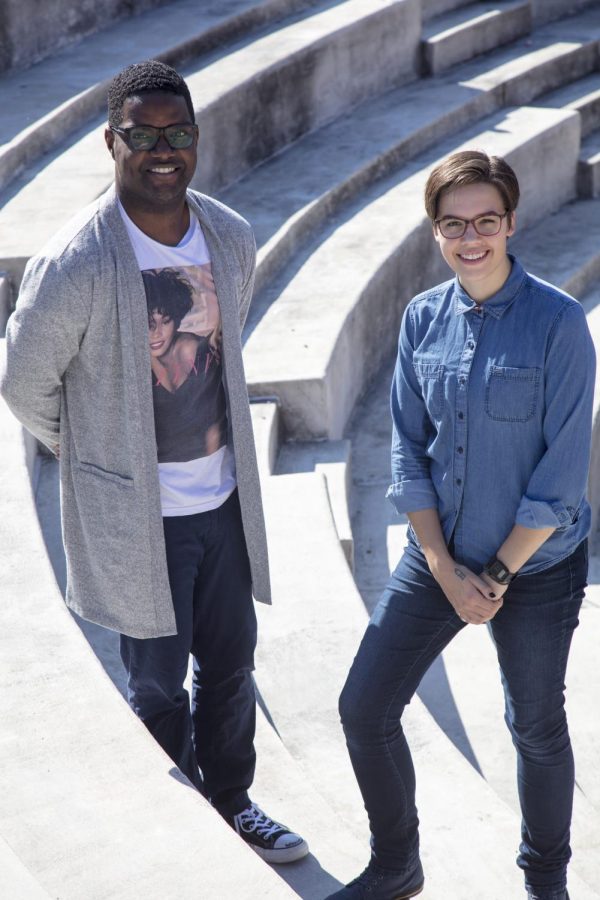MFA theatre part II: Acting welcomes newest cohort
Portraits of Brandon Burditt (MFA acting) and Megan Coffel (lighting design) on the steps of the Krannert Center for Performing Arts on Saturday, Sept. 15th 2018.
Sep 25, 2018
Sitting in a semi-circle in the basement of the Krannert Center for Performing Arts, the 10 new MFA acting students work through monologue pairings in preparation for the upcoming Illinois Shakespeare Festival auditions. Their voices echo throughout the large room and they stomp loudly, smashing the spike tape lines on the floor.
Associate Professor of Acting Robert Anderson sits in the center, helping students find two different pieces that best showcase their abilities. This class, called diagnostics, meets every Friday from 1 to 5 p.m. and helps the new MFA students recognize their good habits and unlearn their bad habits.
The MFA acting program offers admission once every three years to a cohort of 10 carefully selected individuals. Anderson travels throughout the country to find these students. He estimated he saw over 1,500 auditions in his search of the newest class.
Similar to the MFA tech, design and management students selection process, Anderson also goes to the University/Resident Theatre Association, URTA, to see auditions. He also relies on other methods of recruitment like private auditions, recommendations and seeing productions.
“I go to Chicago a lot,” he said. “Last year, I had a place up there because it was recruiting season, so I’d see plays and sometimes I’d reach out to people who I noticed didn’t have their MFA or if I knew someone who knew them.”
Get The Daily Illini in your inbox!
Of the 10 MFA students, Anderson found two through private auditions and eight through URTA, though he knew a couple already from working with their teachers and mentors. All 10 of the new MFA actors were the department’s first choices, which Anderson attributes to the caliber of the program and its commitment to radical inclusion.
“The first line of our mission statement is ‘We stand for radical inclusion,’” Anderson said. “So we’re working on inclusion in the theatre and at institutions. I’ve had a long-term project in my directing and teaching career to change the complexion of the American classical theatre, because I teach a lot of Shakespeare, so it looks like the world.”
Anderson says this is the most diverse cohort yet in terms of minority and socioeconomic representation. There are six male-identifying students, unusual in a discipline where students tend to be overwhelmingly female. The students range from 22 to 35 years old. This cohort also has its first deaf acting student, Andrew Morrill.
Morrill, who minored in theatre studies at the deaf and hard-of-hearing institution Gallaudet University, was drawn to this MFA program for its commitment to radical inclusion. Morrill communicates and performs in American Sign Language and he has two interpreters with him in class.
His presence alone has caused the department to consider curriculum changes to be more inclusive towards deaf actors and to include supertitles at every show.
Despite the changes he has already helped make, the transition for Morrill (who comes from a deaf family and has attended schools where everyone signed) has been challenging. However, he remains positive and is excited to learn new skills and pave a new path toward diversity.
“I’m here to blaze the trail as (well as) put down all barriers,” Morrill said in an email. “I decided to explore more on what it’s like to be (a) deaf actor with intensive trainings. And then, I can walk out with confidence that I have (a) wide range of acting skills. Also, I am here to learn and collect all tools and resources and then I want to create the pipeline for future deaf actors to receive intensive education such as establishing training program for deaf actors.”
The youngest member of the cohort and recent Morehouse College graduate, Brandon Burditt, is also looking to further develop and refine his skills in the next three years. However, he realizes that it isn’t without a cost.
“That’s the thing about grad school,” he explained. “We’re taking a pause on three of our most marketable years in order to get this additional training. But I trust Anderson.”
Post-graduation, Burditt hopes to pursue his lifelong dream of being in film and television. While at Morehouse, he earned a grant to write a play about human trafficking and performed a monologue during a Black Lives Matter tribute. Burditt hopes to continue to intersect art and social justice to make a genuine impact with his work.
“I want to be in a film like ‘BlacKkKlansman’ that really makes an impact because when I was a little, TV and film was something I connected to very easily,” Burditt explained.
Morrill also hopes to be in film, television and Broadway. He aspires to write an award-winning play, be a university professor and establish a BFA program in performance for ASL and English.
Head of the acting department, Lisa Gaye Dixon, is excited to work with the new cohort immediately in the coming years and the time after.
“I’m excited to see students go from wide-eyed wonder to see them really grow as artists. And we form lifelong friendships,” she said. “They move from being a student to a colleague to a friend.”






